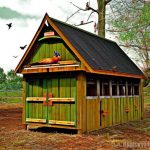Chickens, like all animals, have specific needs that must be met for optimal health and well-being, particularly during winter. Proper winter care for chickens includes providing adequate shelter from cold temperatures and harsh weather conditions. The coop should be well-insulated, draft-free, and protect against wind, rain, and snow.
Access to fresh, unfrozen water is crucial, as chickens can quickly become dehydrated in cold weather. Extra bedding and nesting materials are necessary to keep chickens warm and comfortable. Straw or wood shavings can be used to create a thick layer of insulation on the coop floor and in nesting boxes.
Chickens are susceptible to cold-related health issues such as frostbite and hypothermia. It’s important to monitor the flock regularly for signs of cold stress or illness. Common indicators include lethargy, reduced appetite, and frostbite on combs, wattles, or feet.
Proper nutrition is also essential during winter. Chickens may require additional feed to maintain body heat and energy levels. Providing scratch grains before bedtime can help boost their metabolism overnight.
Ventilation in the coop remains important even in cold weather to prevent moisture buildup and maintain air quality. However, direct drafts on the birds should be avoided. By addressing these specific needs, chicken owners can help ensure their flock remains healthy and productive throughout the winter months.
Table of Contents
- 1 Providing adequate shelter for your chickens
- 2 Insulating the chicken coop
- 3 Using heat lamps or heaters safely
- 4 Providing extra bedding and nesting materials
- 5 Ensuring access to fresh water
- 6 Monitoring your chickens for signs of cold stress or illness
- 7 FAQs
- 7.1 What are the best ways to keep chickens warm in winter?
- 7.2 How can I insulate my chicken coop for winter?
- 7.3 Is it safe to use heat lamps or heated pads for chickens in winter?
- 7.4 What should I feed my chickens to help keep them warm in winter?
- 7.5 How can I prevent frostbite in my chickens during winter?
Key Takeaways
- Chickens need extra care in winter due to their susceptibility to cold temperatures
- Adequate shelter should be provided to protect chickens from harsh weather conditions
- Insulating the chicken coop can help maintain a comfortable temperature for the chickens
- Heat lamps or heaters should be used with caution to prevent fire hazards and burns
- Extra bedding and nesting materials can help chickens stay warm and comfortable
- Access to fresh water is crucial for chickens’ health and well-being in winter
- Regular monitoring for signs of cold stress or illness is important for the overall welfare of the chickens
Providing adequate shelter for your chickens
Key Features of a Winter-Ready Coop
The coop should be draft-free, with no gaps or holes that could let in cold air or moisture. It’s also important to provide enough space for your chickens to roost comfortably and to move around freely. Additionally, the coop should be raised off the ground to prevent moisture from seeping in and causing dampness, which can lead to health issues for your chickens.
Importance of Outdoor Space
In addition to a well-built coop, it’s important to provide your chickens with a run or outdoor area where they can get some fresh air and exercise, even during the winter months. This outdoor space should be protected from wind and snow, and ideally covered with a roof or tarp to provide additional shelter.
Ensuring a Safe and Comfortable Environment
By providing adequate shelter both inside and outside the coop, you can ensure that your chickens have a safe and comfortable environment to live in during the winter. By doing so, you can help your chickens stay warm, healthy, and active, even when the weather is cold and dreary.
Insulating the chicken coop

Insulating the chicken coop is an important step in keeping your flock warm and comfortable during the winter months. Proper insulation helps to retain heat inside the coop and prevent cold drafts from entering. There are several ways to insulate a chicken coop, including adding insulation material to the walls, ceiling, and floor.
Common insulation materials include foam board, fiberglass batts, or even recycled denim insulation. It’s important to ensure that the insulation material is properly installed and does not pose any safety hazards to your chickens. By insulating the coop, you can help maintain a comfortable temperature inside and protect your flock from the cold.
In addition to adding insulation, it’s important to seal any gaps or cracks in the coop that could let in cold air or moisture. This can be done using caulk or weather-stripping around windows, doors, and other openings. Proper ventilation is also crucial for preventing moisture buildup inside the coop, which can lead to dampness and health issues for your chickens.
Insulating the coop while maintaining proper ventilation will help create a warm and dry environment for your flock during the winter months. By taking these steps to insulate the coop, you can help ensure that your chickens stay warm and healthy throughout the colder months.
Using heat lamps or heaters safely
Using heat lamps or heaters safely in the chicken coop can provide additional warmth for your flock during the winter months. However, it’s important to use these heating devices with caution, as they can pose fire hazards and other safety risks if not used properly. When using heat lamps or heaters, it’s important to ensure that they are securely mounted and positioned away from any flammable materials such as bedding or nesting materials.
It’s also crucial to use heating devices that are specifically designed for use in a chicken coop and have built-in safety features such as automatic shut-off switches. By using heat lamps or heaters safely, you can provide your chickens with additional warmth without compromising their safety. In addition to using heat lamps or heaters, it’s important to monitor the temperature inside the coop regularly to ensure that it stays within a safe range for your chickens.
Using a thermometer can help you keep track of the temperature and make adjustments as needed. It’s also important to provide enough space for your chickens to move away from the heat source if they become too warm. By using heat lamps or heaters safely and monitoring the temperature inside the coop, you can provide your flock with additional warmth without putting them at risk.
Providing extra bedding and nesting materials
Providing extra bedding and nesting materials is essential for keeping your chickens warm and comfortable during the winter months. Bedding such as straw, hay, or wood shavings helps insulate the coop floor and provides a soft surface for your chickens to rest on. Nesting materials such as straw or shredded paper provide warmth and comfort for your hens as they lay their eggs.
It’s important to regularly clean and replace bedding and nesting materials to prevent moisture buildup and maintain a clean and healthy environment for your flock. By providing extra bedding and nesting materials, you can help keep your chickens warm and cozy throughout the winter. In addition to providing extra bedding and nesting materials inside the coop, it’s important to ensure that outdoor areas where your chickens roam are also covered with dry bedding or straw to protect them from cold and dampness.
This will provide additional warmth and comfort for your flock as they move around outside during the winter months. By providing extra bedding and nesting materials both inside and outside the coop, you can help ensure that your chickens have a comfortable environment to live in during the colder months.
Ensuring access to fresh water

Preventing Water from Freezing
In cold weather, it’s important to prevent water from freezing by using heated waterers or regularly replacing frozen water with fresh water several times a day.
Maintaining Waterer Functionality
It’s also important to check waterers regularly for clogs or malfunctions that could prevent your chickens from accessing water. By ensuring access to fresh water, you can help keep your flock healthy and hydrated throughout the winter.
Protecting Outdoor Water Sources
In addition to providing access to fresh water inside the coop, it’s important to ensure that outdoor water sources are also protected from freezing. This can be done by using heated waterers or placing waterers in a sheltered area where they are less likely to freeze. It’s also important to regularly check outdoor water sources for ice buildup and make adjustments as needed to ensure that your chickens have access to fresh water at all times.
Monitoring your chickens for signs of cold stress or illness
Monitoring your chickens for signs of cold stress or illness is crucial during the winter months. Chickens are more susceptible to cold-related health issues such as frostbite, hypothermia, respiratory infections, and other illnesses when temperatures drop. It’s important to regularly check on your flock for any signs of distress such as shivering, lethargy, pale combs or wattles, or decreased egg production.
Additionally, it’s important to monitor their behavior and overall well-being on a daily basis to ensure that they are coping well with the colder weather. By monitoring your chickens for signs of cold stress or illness, you can take prompt action to address any issues and keep your flock healthy throughout the winter. In addition to monitoring for signs of cold stress or illness, it’s important to provide extra care for any chickens that may be particularly vulnerable such as young chicks or older hens.
This may include providing additional warmth, extra bedding, or special attention to their health needs. It’s also important to seek veterinary care if any of your chickens show signs of illness or distress that require professional attention. By monitoring your flock closely and providing extra care when needed, you can help ensure that all of your chickens stay healthy and happy throughout the winter months.
In conclusion, understanding the needs of chickens in winter is essential for providing proper care for your flock during the colder months. By providing adequate shelter, insulating the coop, using heating devices safely, providing extra bedding and nesting materials, ensuring access to fresh water, and monitoring for signs of cold stress or illness, you can help keep your chickens healthy and happy throughout the winter. With proper care and attention, you can ensure that your flock stays warm, comfortable, and thriving even when temperatures drop.
If you’re looking for tips on how to keep chickens warm in the winter, you might also be interested in this article on creating a garden chicken coop. This article provides helpful information on designing a coop that provides warmth and protection for your chickens during the colder months.
FAQs
What are the best ways to keep chickens warm in winter?
Some of the best ways to keep chickens warm in winter include providing a well-insulated coop, using heat lamps or heated pads, and ensuring good ventilation while avoiding drafts.
How can I insulate my chicken coop for winter?
You can insulate your chicken coop for winter by adding extra bedding, sealing any drafts, and using insulating materials such as foam board or straw bales.
Is it safe to use heat lamps or heated pads for chickens in winter?
It can be safe to use heat lamps or heated pads for chickens in winter, but it’s important to follow safety guidelines and ensure that the heating devices are securely installed to prevent fire hazards.
What should I feed my chickens to help keep them warm in winter?
Feeding your chickens a balanced diet with plenty of protein and energy-rich foods can help keep them warm in winter. You can also provide warm, cooked foods and plenty of fresh water.
How can I prevent frostbite in my chickens during winter?
To prevent frostbite in chickens during winter, make sure the coop is well-insulated, provide extra bedding, and check for signs of frostbite on the comb, wattles, and feet. You can also use petroleum jelly to protect exposed areas.
Meet Walter, the feathered-friend fanatic of Florida! Nestled in the sunshine state, Walter struts through life with his feathered companions, clucking his way to happiness. With a coop that’s fancier than a five-star hotel, he’s the Don Juan of the chicken world. When he’s not teaching his hens to do the cha-cha, you’ll find him in a heated debate with his prized rooster, Sir Clucks-a-Lot. Walter’s poultry passion is no yolk; he’s the sunny-side-up guy you never knew you needed in your flock of friends!







